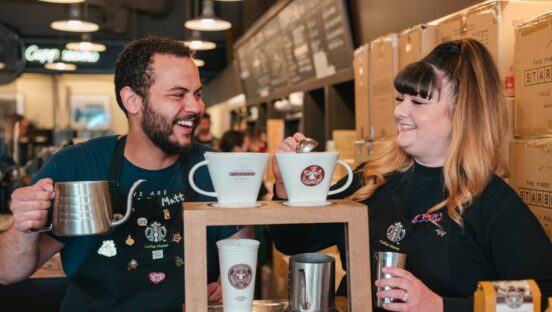Starbucks announced Wednesday that President and CEO Kevin Johnson plans to retire in April.
To facilitate a smooth transition, the board of directors appointed founder and former leader Howard Schultz as interim CEO, effective April 4. Schultz previously served as CEO from 2008-2017 and 1985-2000 and as president from 2008-2015 and 1985-1994. During his time as leader, Starbucks grew from 11 stores with 100 employees to more than 28,000 units in 77 countries. From its IPO in 1992 to when Schultz stepped down as executive chairman in 2018, the chain’s stock price gained 21,000 percent. He will receive a base salary of $1 as interim CEO.
Johnson will serve as a special consultant to Starbucks and the board of directors through September.
“A year ago, I signaled to the Board that as the global pandemic neared an end, I would be considering retirement from Starbucks,” Johnson said in a statement. “I feel this is a natural bookend to my 13 years with the company. As I make this transition, we are very fortunate to have a founder who is able to step in on an interim basis, giving the Board time to further explore potential candidates and make the right long-term succession decision for the company. I have enjoyed every minute of the job and am proud of what we have achieved together. It has been an honor to serve the 400,000 Starbucks green apron partners around the world and I want to thank them for their service, resilience and optimism.”
The industry veteran has served on the Starbucks Board of Directors since 2009 and joined the C-suite in 2015 as president and COO. He was named CEO in 2017, succeeding Schultz. Prior to working at the coffee giant, Johnson spent six years as CEO of tech company Juniper Network and and 16 years at Microsoft in various roles.
During his Starbucks tenure, Johnson was responsible for the chain’s People Positive, Planet Positive, and Profit Positive framework to create a better world for employees, farmers, customers, and communities, the Global Coffee Alliance with Nestlé, which operates in nearly 80 markets, and the Growth at Scale agenda that “significantly increased” shareholder value, according to the company. Under Johnson, Starbucks scaled its rewards program to nearly 45 million members in the U.S. and China.
“On behalf of the entire Board, I want to express our sincerest thanks to Kevin for his leadership of Starbucks,” Mellody Hobson, independent board of directors chair, said in a statement. “Kevin and the entire executive team steppedup to the challenge of the pandemic and navigated one of the most difficult periods in modern history. The economic certainty provided to partners during the early months of the COVID shut down, as well as during mandatory quarantines, underscores our core values and will be an enduring legacy for the company.”
Starbucks has been engaged in succession planning since 2021 with Russell Reynolds Associates. The brand believes it will have a new leader by the fall.
Peter Saleh, analyst at financial services firm BTIG, described Schultz as the best candidate to lead Starbucks through the temporary period. Saleh noted that when Schultz returned as CEO in 2008, he right-sized the store base by closing hundreds of locations, repositioned the menu with more focus on innovation, and began efforts toward a loyalty and digital program. The coffee chain operates twice as many stores as it did in 2008 and experiences earnings 10x what they were 14 years ago.
“In our view, Mr. Schultz’s passion for the brand and track record for success should be met with open arms from investors,” Saleh said in his note. “We cannot think of a better executive to lead the brand at this stage in its growth cycle, as it emerges from the pandemic and works to appease partners, unions and shareholders alike.”
The brand earned a Q1 record $8.1 billion in revenue, with U.S. same-store sales rising 18 percent. That includes a 12 percent bump in transactions. Mobile order and pay, drive-thru, and delivery accounted for more than 70 percent of Starbucks sales in Q1. Drive-thrus posted their fourth straight period of double-digit comps growth. The company opened 484 net new stores in the quarter, to put it at 34,317 units globally, including 15,500 in the U.S.









